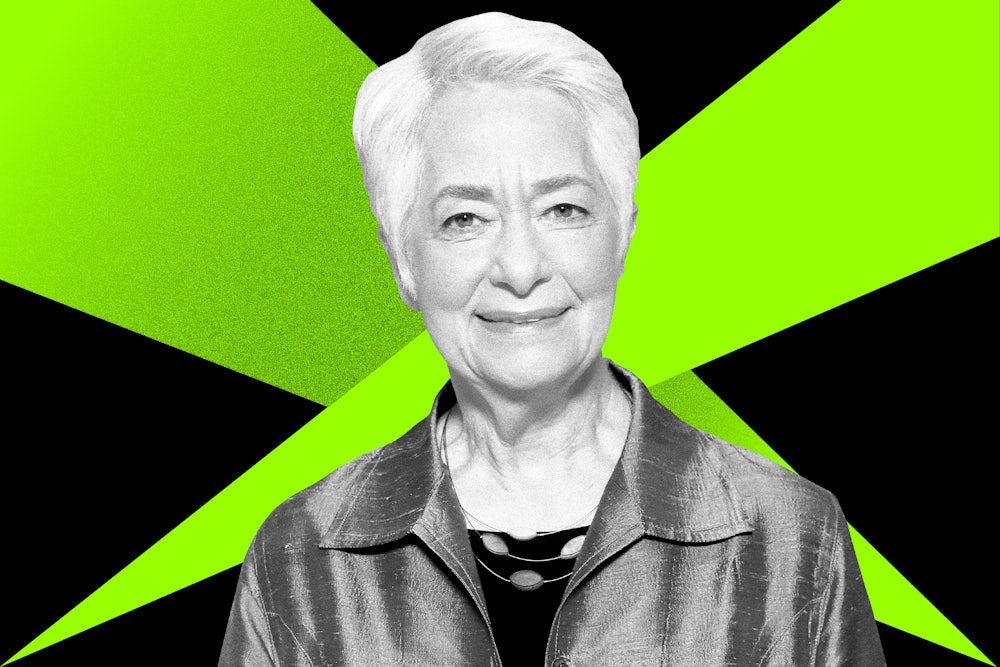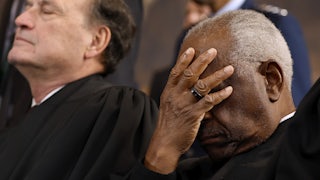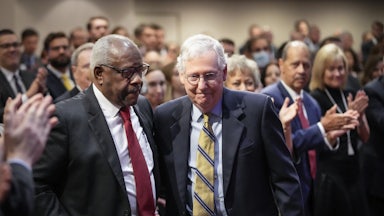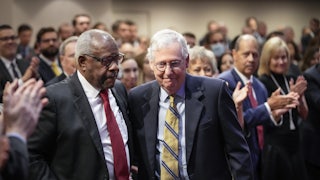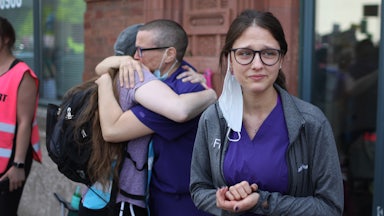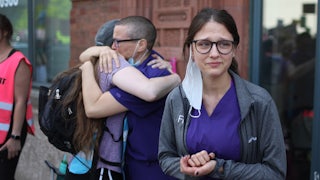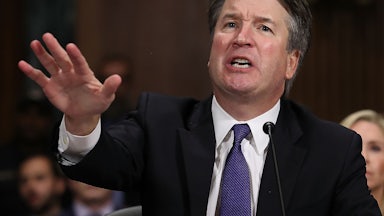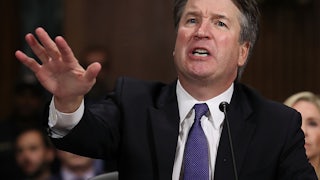On June 24, the day the Supreme Court overturned Roe v. Wade, Heather Booth had tickets to see To Kill a Mockingbird with a friend in Washington. She could hardly bring herself to go because she was so “horrified and angry,” and because she wanted to spend her time doing what she has spent six decades doing—fighting for justice. On a day like that one, Harper Lee’s novel took on a new significance for Booth. It’s OK to kill a jaybird, she explained, because jaybirds are aggressive. “But it’s a sin against nature to kill a mockingbird,” she said, “because a mockingbird is innocent.” It made her think, she said, of the Mississippi family she lived with during the Freedom Summer project in 1964, whose home was firebombed twice, and of the women who have just been robbed of a fundamental freedom.
So she mourned, certainly; but Booth is chiefly an organizer, going back to her days as a member of the Jane Collective, which secured safe abortions for women in Chicago before abortion became legal in Illinois. (She’s also featured in a new HBO documentary, The Janes, which focuses on those efforts.)
In this Tomaskycast, Booth lays out a plan for how activists should approach this year’s midterm elections (the four m’s: members, message, money, and movement) to help Democrats gain two senators who will make filibuster reform possible and maintain Democratic control of the House to—among other things—codify abortion rights. “The protest that’s essential is not enough,” she said. “What we need to do is build the power that is converted to political power that elects those officials” at the state and federal levels who will fight to protect abortion rights, voting rights, and more.
Michael Tomasky: Hello again, folks. This is Michael Tomasky. I’m the editor of The New Republic, and this is a new edition of Tomaskycast. I am joined by the great Heather Booth. Heather is a longtime activist in a number of areas, particularly with regard to abortion rights, among many, many other things, and I thought it was important to talk to Heather, in the wake of the Dobbs decision, about what we do now. Heather, thanks for joining me.
Heather Booth: I really appreciate the opportunity. And I am glad to be with the great Michael Tomasky because you’re providing a vehicle for sharing messages, sharing what we need to do, sharing thoughtful and strategic insights about how we move forward.
Michael: Where were you when you heard about the Dobbs decision, and how did you react?
Heather: In some ways, it’s like when you know a friend is dying, and then they die. So there’s a way in which this wasn’t surprising, because we knew that this was coming. We knew that there’s been a 50-year war on women, freedom, and democracy by a right-wing MAGA faction, as well as parts of evangelical churches, to undermine this most intimate decision in a person’s life about when, whether, and with whom we have a child or start a family. It was outrageous. And I was both horrified and angry. Women will be harmed; some will die. There used to be septic abortion wards in hospitals where women had harmed themselves or were harmed. Those may return. And it especially will be harmful for those without the financial resources or family and community supports, or the information, or the feasibility of traveling to other places. And so I was outraged. And I wasn’t really surprised. But I am trying to turn my anger into action.
Michael: I mean, we weren’t surprised, and it largely comported with the famous Politico leak from May. But I still was a little taken aback at the breadth of the decision, at the extent of it, at the radicalism of it, you know? Particularly [Justice Clarence] Thomas’s concurrence.
Heather: You know, Thomas’s comments, questioning—should contraception be overturned? Should consensual sex be overturned? Should marriage equality be overturned? This is obviously an extremist, nonjudicial [concurrence]—he may be officially a judge, but it doesn’t have the reflection of a judge who cares about either popular opinion or popular need. I know you and many of your readers may know that right now, one in five people who can have a child will have an abortion. That figure was one in three. And then it was one in four. Now it’s one in five because of [both] the increased access to … contraception and the further restrictions that have limited people’s options. The majority of people who have abortions now already have a child. That means they know what it means to bring a child into the world and be responsible for them, and they realize that it’s not the right time, and that’s why they’re looking for this additional care.
You know, I had a personal experience on Friday. The decision came out, and thinking I was prepared for it, I was ready to move ahead. I started to send out the word, to move on messages, to try and find out the next action we do. And that night, I had long-planned tickets with a friend to see To Kill a Mockingbird, the play. I canceled our dinner together. I was just too busy. I thought, “Well, I’ll probably leave during the intermission, I’m just too busy.” But I wanted to respect my friend, and wanted to see the play. So I went. Though I had read the book and seen the movie, I had forgotten why the play was named what it was. There’s a line in it that says, or implies, words to the effect of, you can kill a jaybird, because jaybirds, by implication, are vicious and attack others. But it’s a sin against nature to kill a mockingbird, because a mockingbird is innocent. And the play is about the conviction, and later the lynching, of an innocent Black man. I mentioned the story because when you say, “How did I react?”—when I heard the Roe decision, I thought I was just moving ahead. And then when I was watching the play, I was overcome with weeping, and weeping so intensely that I actually thought, “I better get a grip, [or] they’ll remove me from the theater.” I’m still affected by it. And I think it’s not just Roe. It’s sort of everything.
When I was in Mississippi, in the Freedom Summer project in 1964, the family I lived with in Shaw, Mississippi, the Hawkins family, after the summer, because they had stood up for freedom, their house was firebombed twice. And in the second firebombing, their son and two grandchildren were killed.
Michael: Oh, my God.
Heather: And then Mrs. Hawkins later was killed by a policeman. And most people don’t even know about that story, though there’s much more to tell on it. I knew about it because I had lived with them. And what I realized is that we’re in a time that is being a pushback on voting rights. And the freedom we care in general about, we’re being pushed back, by undermining what we have in democracy—[elections themselves]—with this criminal conspiracy that’s being now exposed in these January 6 hearings. And it’s exhausting … just being around this level of hate and conflict. So I think it’s everything that affected me. So when you ask, “How did I react?”—in my head, I reacted: Let’s move ahead. Here’s our plan. And in my heart, I find it just such a painful time.
And so we particularly need to stay together as a community that values freedom and justice and democracy, and move ahead and realize that Justice Andrew Hawkins and Mary Lou Hawkins thought it was worth the struggle for freedom to even take that risk that he took. And because people have organized and taken some risks that we now need to take, we did win voting rights. We did win Roe. We did win more reproductive freedom and more justice, [though] not enough. But the only way we win there is when we organize.
Michael: So let’s talk about the moving forward part. What have you been doing to move forward?
Heather: What we all need to do, it’s on multiple levels. I talk about four m’s: We need members. So we need to reach out, we need more people, there needs to be engagement. We had 80 million votes, 81 million votes, for Biden—more votes than any president has ever received. We had 7.1 million more votes for Biden than for Trump, when even a year before we thought that Trump might very well win the presidency. But we won because people organized, we recruited people, we energized them. Right now there are people who are so dispirited, they’re not sure elections matter, they’re not sure they should turn out. It’s especially true in a midterm election. So we need to recruit people; we need to persuade that small number of people who now are as horrified by the January 6 hearings as they are by this decision undermining women’s most intimate decision in our lives that maybe there’ll be a portion that would be persuaded. And this portion will also decide, “I need to take action now, I need to become engaged, and I need to vote.”
The second m is message–what we say, that what you do in writing, on your videos, on sending out a message, it matters so much. The most effective way to talk about this decision in order to persuade and energize people is to connect it to their own life, not to make it an abstraction.To tie it to people’s lives. And I said before: It could be your sister, your friend, your cousin; it could be you.
The third is money. We need to give support for those centers, for the National Network of Abortion [Funds], for organizations, whether it’s large ones like Planned Parenthood or SisterSong, a Black-led organization primarily in the South, or going to support some of the centers that are still providing care, and the candidates and the campaigns and the organizations. So money will matter.
And the fourth is movement. We need to show up. So we can turn out, we can demonstrate, we can raise our voice, we can give our money, and we need to recruit others, and we need to be there. But the protests, while essential, are not enough. We need to build the power that is converted to political power that elects those officials at the state—secretaries of state, governors, change in the legislature, and senators—two more Democratic senators who respect reproductive freedom and are willing to address the filibuster rule. Two more. And we hold the House for Democrats, because the House has already said that they are in support of this. We can overturn the filibuster rule. It’s just a rule. You need two-thirds of a vote in the Senate to stop debate. But you can change the rule with a simple majority.
Michael: Are you at all optimistic about November? I mean, do you think that this and the gun issue are turning things around with those remaining middle-of-the- road voters who do still exist?
Heather: Well, it’s not just the middle-of-the-road voters! It’s the people who are our supporters, young people who … haven’t yet understood how important it is to vote. Or older voters, or people who’ve been tired, or people in the movement who’ve decided, “Is there any hope?” And the answer, first of all, is, “What is the alternative?” If we want a life for ourselves, for our children, for our grandchildren. I’m now 76. I do care about my grandchildren and their children. I started when I was a young teenager, and now it’s up to another generation. But what’s the alternative? Andrew and Mary Lou Hawkins knew that it was worth the struggle, not just to die for freedom but to live for freedom and to do the work every day. When it’s too hot or too cold, or you’re too tired, or it’s too boring. But you have to organize if you want to change the world.
The second reason is that there are changes going on, and we should spread the message that there is a path forward. If a big part of what we need to do is energize Democrats who voted for Biden and now need to decide to vote in the election, or people who’ve come of age between the last presidential election and this midterm, we need to engage them. There was just a poll last week, at an NPR/PBS Newshour/Marist survey, that said, among registered voters, 78 percent of Democrats said the Supreme Court ruling made it more likely that they would vote in November, but only 20 percent of Republicans.
Plus, there are other reasons. The redistricting was not as bad as we thought because people worked and took action. And then, if the election is seen as a choice between real candidates—two real candidates—and it’s not seen as a referendum of, like: Do you think things are fine? Have our wishes been met? Our wishes aren’t met. But in the real choice between two candidates, we’ve got this phony Dr. Oz, who may in fact be registered to vote in New Jersey and not Pennsylvania, where he says he’s running for Senate, or the Republican governor candidate who was in the January 6 criminal conspiracy against this country that was planned and paid for and promoted by the MAGA Republicans. Or in Georgia, we’ve got an excellent senator running against someone who says that he graduated in the top of his class, but he may not even have graduated from college at all. And so in these real choices, we have a choice. And the main thing is, we need to know, there is a path forward. And it is up to us. You know the great Dr. King quote as, “The moral arc of the universe bends toward justice,” but it’s we who need to bend it. And if there was ever a time we are called to do that bending, it’s now.
Michael: I’d like you to talk a little bit about your past experiences. I think most people watching this probably know of your work with the Jane Collective in Chicago, helping women procure safe abortions before abortion was legal. So just paint a picture of what that was like and what we could be headed toward in certain parts of this country again.
Heather: I got involved in this simply as being kind to a friend, doing a good deed. I didn’t view it as a political act. A friend of mine, who’s in the movement, said that his sister was pregnant and nearly suicidal, and wanted to find someone to provide an abortion. You know, in 1965, when this happened, I was 19 years old. We didn’t talk about sex publicly. We didn’t know about it. I didn’t know much about my own body until I read Our Bodies, Ourselves and had other discussions. And I certainly don’t recall having talked about abortion. But I said I would try to help simply as a friend, and I found a doctor through the Medical Committee for Human Rights, the medical arm of the civil rights movement. He was a fabulous physician. His name was Dr. T.R.M. Howard. He really needs respect. He had been a civil rights leader in Mississippi when his name appeared on a Klan death list, in part because he said there should be an investigation of the murder of Emmett Till.
Michael: Dr. Howard is a fascinating person. I read his biography just a few years ago. He has an incredible, incredible life story.
Heather: I have one here on Dr. Howard too. So I contacted him; he provided the abortion. And I didn’t think much more about it. But then word must have spread, and someone else called. Word spread again, someone else called, and someone else called. And I realized I better set up a system. And three people talking about providing an abortion in Chicago was a conspiracy to commit a felony. So we called it Jane. Over time, there were too many women coming through; I couldn’t manage it myself. I recruited others into what we had called the service. And Dr. Howard was no longer available. I found someone else named Mike. And over time, so many were coming through. At its height, I think about 100 women were coming through a week. Mike couldn’t do it himself. He also decided to get out of this practice. And Mike trained the other women that I had recruited and others who then were drawn to it, which really was the Jane network. And he taught them how to provide the procedure. And over time, the women of Jane themselves performed 11,000 abortions that were safe. They were done in a caring environment. But it wasn’t legal. And so it all started out of a values-driven commitment to do a good deed for someone else. And I think that that’s how all of our politics should be focused; that it’s about making the world better for real people who are in need of better conditions and a better world.
Michael: And talk a bit about what you think we’re headed toward today in certain states.
Heather: In about half the states of this country, there’ll be greater restrictions or bans, and not even that, there’ll be a criminalization where you can even get like an authoritarian country. Ten thousand dollars in Texas, if you inform on someone else—your sister, your cousin, your neighbor—who is seeking an abortion and seeking a way to make this most intimate decision of their lives. In Oklahoma, it’s up to $100,000. And what are we going to do that first day that someone has paid $10,000 for this; when the first doctor is arrested? We have to plan for that. And as I said before, the people with means, with financial resources, there will be a way for them to find the care that they need. In many cases, not at all—some may find out too late. And then if you have to travel, if you have to make arrangements, you have to know where to go. But particularly for those without the resources, without the support, they will face levels of hardship, limitations in their life, likelihood of increased poverty, likelihood of thwarted futures, and, for many, desperate health situations, and some may even die. And it will particularly be made worse by race. Women of color, African Americans, Latinos, Indigenous women will particularly find this harder, and particularly those who are poorer within the society or [have] less access to other resources.
But there are differences between now and when I was involved with the Jane network. The right wing certainly is different. It’s been politicized. It’s been monetized; there is money behind this vicious right-wing attack on one of our great freedoms. But it’s also true there are more providers now. More are women, more are caring. There are expansive networks of support. But they need greater support. A center that was providing perhaps 500 abortions before now has 1,000 coming through. They don’t have the resources, they don’t have support, they don’t have the time in the day to provide all the care that’s needed. But the biggest thing that’s changed is that we as a people have changed. You and I have changed; your magazine has changed. The world has changed. The country has changed. Eighty percent of this country does not think that a politician should come between a woman and this most intimate decision of our lives. Eighty percent. Over 70 percent think Roe shouldn’t have been overturned. And even with various restrictions, it’s the largest majority in this country that doesn’t think we should be doing these bans or attacks on women making this decision. And so, given that we have changed, given that this is so unpopular, given that it is so against constitutional precedent, given that it is against what a democracy should stand for, now is the time we need to organize. We need to turn out, we need to send the messages, we need to give the financial support. And we need to vote, encourage others to vote, and take the shifts now to do what Andrew and Mary Lou Hawkins knew. To know that it is worth taking some risks, to live with greater freedom and democracy for all.
Michael: I love the way you invoke freedom and democracy because these are values that every American is taught to cherish, and … I think the Democrats have kind of let the Republicans have those concepts, certainly freedoms. And they need to be reclaimed.
Heather Booth, thank you so much for joining me.
Note: This transcript was condensed and lightly edited for clarity and cohesion.
